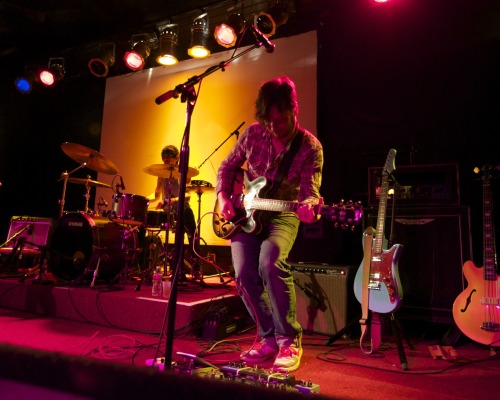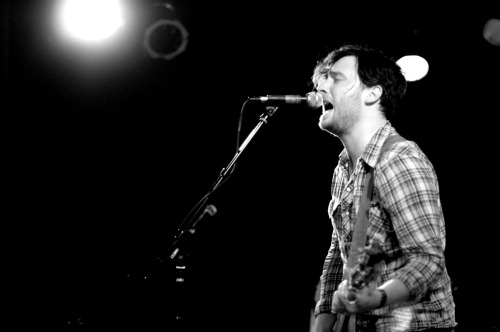I stood near the front of the stage, nursing a Brooklyn Lager and singing along as I had hundreds of times before. Every nerve in my body was taut, swelled with pride: my brother’s band, The Damnwells, were headlining a sold-out CD release show at Siné, the legendary New York City venue where Jeff Buckley recorded his haunting live album years earlier. I’d never seen my brother play for so many people. Since I’d moved to Houston from New York, his band had become an overnight sensation seven years in the making. I recognized a few faces, but most of the crowd were fans — actual fans — singing along to every word just like me. A few caught my eye; I was certain they knew I was Alex’s sister. I felt like a rockstar.
 Photo: Anna Sneed
Photo: Anna Sneed
I had traveled all day to be there for this. I was living in Texas, newly married and starting a business. My husband and I took a cab directly from the airport to the club and stashed our bags behind the ticket window. We were hungry, tired, and this trip cost a lot of money we didn’t have, but I didn’t care. This was my baby brother, and this was his moment. About halfway through their set Alex announced they would play a new song, one that wasn’t on the record. The crowd swelled forward. As the melody started and the lyrics began my heart, swollen as it was, caught in my throat. I listened:
“Cameron is pushing her Jesus / maybe she needs to believe / maybe her Jesus could come save me” *
I’d had no warning he would be singing a song that would spill my story into a roomful of strangers. Not to mention Sean Penn who was sitting at the bar. My mouth hung open.
 My life changed dramatically in the year leading to my departure from New York. Alex and I had lived in the same Brooklyn neighborhood, supporting each other (I went to his shows, he went to mine) for years. We’d always been close; we’d navigated the minefield of our parents’ divorce and had a war-forged devotion to each other. I taught Alex everything: which music was cool (Hendrix, The Smiths), what girls like (mohawks, skateboards, boys who brush their teeth), what’s important (literature, college). Our father had been out of the picture for so long that I became a second mother to him, nurturing him in the ways of the world. And he reciprocated — he listened. Each time I wrote a poem, he listened intently as I read aloud. When I went off to college to study creative writing, I called at all hours of the night to read him my latest pieces.
My life changed dramatically in the year leading to my departure from New York. Alex and I had lived in the same Brooklyn neighborhood, supporting each other (I went to his shows, he went to mine) for years. We’d always been close; we’d navigated the minefield of our parents’ divorce and had a war-forged devotion to each other. I taught Alex everything: which music was cool (Hendrix, The Smiths), what girls like (mohawks, skateboards, boys who brush their teeth), what’s important (literature, college). Our father had been out of the picture for so long that I became a second mother to him, nurturing him in the ways of the world. And he reciprocated — he listened. Each time I wrote a poem, he listened intently as I read aloud. When I went off to college to study creative writing, I called at all hours of the night to read him my latest pieces.
At age 23 I hit my own minefield, one that Alex couldn’t rescue me from. Drugs, bad relationships, and insomnia closed in and I crumbled into an anxious mess. My hard earned system of self-reliance was breaking down and I was desperate for something more. At a Christmas party in the West Village I met a beautiful blonde girl whose fiancé was a poet. Together they attended a small house church in my neighborhood and she invited me to check it out. Pretty soon I was hanging out with a group of singers, artists, and pastors — British ex-pats who were planting a house church in Sunset Park. I drifted from my brother and our mutual friends, finding myself more and more in this community of faith.
In the hubris of my new religion, I thought Jesus could solve all of my brother’s problems, which at the time were centered on lethargic record companies and publishers. I prayed fervently for him, as did my new friends. I had so many practical and emotional breakthroughs in my own life; I wanted my brother to experience the same things. I assumed he would see how my life had changed for the better and follow along. I talked, he listened. I pushed, he pushed back. I argued, he yelled. Eventually silence grew between us, punctuated by explosive and sometimes vicious fights. My conversion was real, but it divided us. I had no finesse in my clumsy attempts at evangelism, but I ached for him to join me, to understand. I was baptized on Coney Island in a lightning storm, and ever faithful, he stood on the beach and watched, hands dug deep in the pockets of his Levi’s. I knew he wrestled with the turn I’d taken, but we stopped talking about it. We suddenly got polite.
That night at the club, when I heard “55 Pictures” for the first time, I wanted to turn and run, but I didn’t dare. My mascara- and snot-streaked face would’ve given me away. Guilt and grief gnawed at my gut. Have I abandoned him, I thought, like Dad abandoned us?
All of my brother’s songs are about leaving and being left, letting go and hanging on for dear life, undeserved love and death-defying devotion. He writes and sings, and I listen, trying to understand how he understands the world. As I heard him sing my name and challenge me, I grieved. I grieved the miles between us, both literal and spiritual. I grieved that this gulf couldn’t be bridged by a powwow about skateboard tricks or girls. When I’d cleaned myself up and was getting ready to leave, I started to ask Alex about the song. But then I stopped myself.
Since my brother has become a songwriter, a really good songwriter, we don’t talk much. We talk, but we don’t talk, not often anyway. Maybe we don’t need to.
“I’m sitting alone in the balcony of this bar, drinking whiskey, and my father is dying,” Alex told me, from a tour stop in Minneapolis. “And I don’t think I feel anything.”
I had just told him that our 82-year-old father was dying and that even though it had been three years, I thought he should go see him one more time. Though I was quite numb on the subject myself, I still tried to mother him. I feared that Dad would die and Alex would regret not making one more trip. His response was lukewarm and I hung up frustrated. I felt like he hadn’t heard me.
A few weeks ago I tuned in as Alex gave a free online concert for his fans, despite my vague irritation that I found out about the concert on Twitter like everybody else. About halfway through the set he announced that he would play a new song, one not on the record:
“Maybe I’ll never see you again / but I’d like to / just one more time / hold your face like a child holds on / to blameless love / There are airplanes / and there are freeways / but none of those things will bring you here / ’cause none of these things will make you love me” **
 Photo: Anna Sneed
Photo: Anna Sneed
Before I knew it, I was sobbing, feeling all the emotions I had numbed about my father. I looked at the web site counter; over 1,400 people had tuned in and were, at this moment, hearing this song for the first time, just like me. Hearing my baby brother’s broken heart over the father he may never see again.
Recently Alex’s band made a tour stop in Houston, and my daughter and I met him at a café before soundcheck. It was awkward, hard to talk. He was antsy and I was distracted. Later that night I stood in the audience alone, nursing a Lone Star. As he sang his heart out once again, the stories of my life — of our life — played out before me in a room full of strangers. And I sang along.
I realized then that somehow I understand him better singing. I understand us better singing. For all we’ve been through together, of course we can’t chitchat or make small talk. What better way to communicate than through epic, heartbreaking music, with hundreds of strangers singing along?

Though I’m his sister, I’m also just a fan. Though many of the particulars of his songs are stolen truths from our life together, I would surrender them all again just to hear him sing. Sometimes, it’s the only way I know how he feels. There are some things you can only really understand singing.
* From “55 Pictures” by The Damnwells, lyric by Alex Dezen. ©2009 Bearded Emperor (BMI).
** From “None of These Things,” lyric by Alex Dezen, ©2011 Bearded Emperor (BMI).
All lyrics used by permission.
Cameron Dezen Hammon is a songwriter and worship leader at Ecclesia Church in Houston, Texas, where she lives with her husband and four-year-old daughter. Find her at www.hipsterchristianhousewife.blogspot.com.














